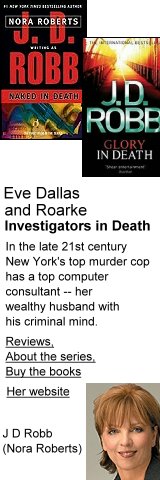Summer 2013-4
The Joy in Enjoyment
We ask a lot of books (and writers), and not the same things. Different people, different times, different places in our lives, all these things affect what we are looking for from stories written, spoken and filmed. Bruno Bettleheim in The Uses of Enchantment wrote about how children demanded certain stories again and again depending on what was going on in their lives, on what issues they were facing.
It's the same with adults. Some adults just want the boom! crash! noise! of unthinking films and books, some want characters who triumph over life-changing adversities. For many, including publishers, this divide is gender-based.

What I want right now is joy. I want stories that are told with a touch of wit and whimsy. They can be laugh-out-loud comedies, or suspense thrillers, or romances, just as long as the author has an eye for the wry side of life. John Sandford in his various series finds humour in irony, his characters are intelligent enough to have a sense of humour and his writing is intelligent enough to include it gracefully. Lucas Davenport is a hard man who makes hard decisions, he also tends to compare everything's size to that of his manly part. That's not in itself hilarious, but it is amusing in an everyday way when his wife steps in to interrupt him at the hospital.

During our spring I read and reviewed a lot of books, practically all of them chosen because they promised humour. Some succeeded, some didn't. In Thankless in Death (Nora Roberts writing as J D Robb), Eve Dallas' endless battle of wits against the chocolate thief didn't make the pages, nor did the cat make it, even the running hostilities with Summerset took the back as the crime story was told interspersed with the spectre of thanksgiving with the Irish relatives. The In Death series often plays with Dallas' discomfit with things girly -- her horror of beauty treatments, her dislike of shoes made for looks nor comfit, the terror of being present at a birth. As a series it underlies quite violent crimes with the romance of Eve and Roarke and the comedy of Eve and Peabody and their reactions to their world.

Humour plays a greater part in the stories of Janet Evanovich. In Notorious Nineteen, Stephanie Plum is back facing down bad guys, doughnuts and boyfriend decisions. The Plum stories are told with unabashed humour and are a laugh-filled ride against crime where the heroine relies more on luck than ninja skills to win the day. Evanovich's new series with Lee Goldberg (Pros and Cons and The Heist) suffer a little from the success and expectations brought by the Plum series. The O'Hare series is not told with the same humour and a reader expecting a happy tale won't find one. The pairing of a con man and a cop is not a new one, the female cop fascinated by the male miscreant has been done before, but the writers could rise above the premise if the characters and their relationship were drawn well. In this case the authors are efficient, but I wasn't left with a desire to discover their next adventure, and I don't have memories of a romantic and witty tension. Evanovich's newest title Takedown Twenty is reviewed in this issue.

Speaking of ninja skills, a series that doesn't have a great deal of humour but has a compelling dramatic tension in the relationships of the characters is Zoe Sharp's Charlie Fox series. I reviewed First Drop, which was part of a bundle from storybundle.com. This meant going back and reading the series up to and including that book. I keep wanting to finish the series, although there are a few dollars involved, even in ebook format. If my to-be-read pile ever gets under control I want to find out what happens next. Charlie is a woman with skills and a history and her dealings with an American teenager would probably be amusing to parents although I just wanted to give the kid a good slapping.

Lawrence Block released The Burglar Who Counted the Spoons, and even the press release was written with humour. Bernie is back, facing the fact that he just isn't made to got straight, so why fight it? He inevitably gets into trouble, or if not, a crooked cop brings it to him. Block likes his characters Bernie and Carolyn to indulge in running gags, not forced, just the kind of humour that people with a little insight into coincidences and incongruities indulge in. The pair share lunches from an ever-changing restaurant and their responses are not hilarious, but gently amusing. There is something very inclusive about running gags, we, the audience, feel like we are part of them. We embrace them as friends do. This is something that the best of series achieve, an ongoing relationship between the readers and the characters. Comedies and adventures aside, we are just plain interested in their lives and the way they describe them.
Lawrence Block, by the way, is the one who introduced me to P. G. Wodehouse. Jeeves and Bertie Wooster. Lord Elsmworth and the crew at Blandings. Pure musical comedy without the soundtrack. Wodehouse wrote with the eclat of a man who knows his English grammar and wouldn't let it get in the way of a good turn of phrase. There is wit in his insight into character and motivation and in the very way he puts pen to paper.
Two Guys Detective Agency (Stephanie Bond) promised to be a humorous look at amateur detectives turning pro. Perhaps parents of small children might find more humour in the chaos of struggling finances and life with small children. I found the main protagonist more than a bit dreary. A housewife and a trophy wife with no special skills and no special insights were completely uncompelling and I haven't the least curiosity about what they do next. I certainly wouldn't expect a fun tale.

Kerry Greenwood's Phryne Fisher series has hit the small screen worldwide and a new book is out (Murder and Mendelssohn). I haven't got my copy yet, but expect a review and a new interview with Kerry early in Summer 2013. Phryne's adventures are told with gentle good humour. Greenwood doesn't try for a comedy, but she has a wry turn of phrase that plays with our expectations and lifts the reader's spirits. There is something about the play of ideas and words by the author that suggests that the readers are in on the joke, and Greenwood is one of the best at this. The Corinna Chapman series, similarly has a deft touch with language as well as the running gags of the never-ending appetite of her apprentice and the two would-be actress shop assistants that she can only tell apart by their belly rings.
So this issue, what am I looking for in the books I read and review? Wit. Insight. Pace. Interesting characters in interesting situations. And a feeling that the time I have spent with the characters and their author has been well spent.
New in November 2013
Short reviews of books we've seen this month in Reading Matters. We'll be adding to it as the month goes on.
The Usual Questions Project
More authors have answered The Usual Questions, our quirky, Q and A sessions.
Anyone who is a professional can be part of the project: authors, illustrators, film-makers, performers. The Usual Questions index page has a list of the authors and actors participating in the project.

| This issue, an interview with Phryne Fisher and Corinna Chapman's creator Melbourne author Kerry Greenwood. |






 Published in Melbourne, Victoria, Australia
Published in Melbourne, Victoria, Australia